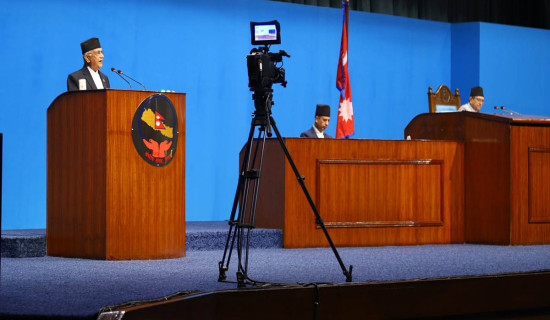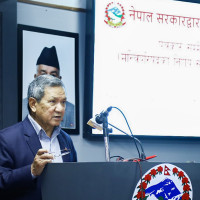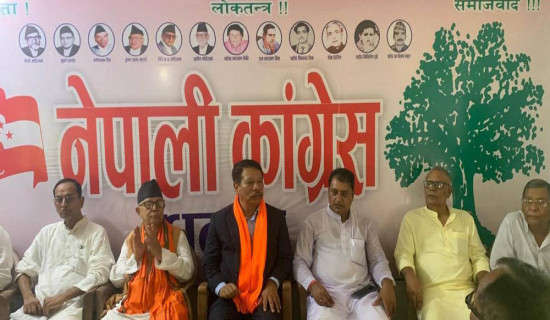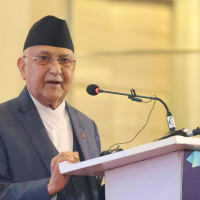- Wednesday, 23 July 2025
Differences stall School Education, Civil Service Bill
By Pallav Bhusal,Kathmandu, July 23: The future of the long-awaited School Education Bill has been pushed into further uncertainty, as the government continues to delay its endorsement despite repeated commitments. The Education Ministry, under Raghuji Pant, has shown little urgency in resuming discussions on the bill, which is central to implementing Nepal’s constitutional goals of decentralised and inclusive education.
The bill, which had already been deferred thrice by the House Education, Health and Information Technology Committee, was last discussed on July 6. That meeting too was postponed at the request of Education Minister Pant and Nepali Congress Chief Whip Shyam Ghimire, with a five-day deadline set to address contentious issues raised by the Nepal Teachers’ Federation. But more than two weeks later, the committee has not reconvened.
Former Education Minister and CPN-UML lawmaker Bidya Bhattarai, a member of the House Education Committee, said there was no reason to delay the bill any longer. “Most of the teachers’ demands, apart from a few on promotion and transfer, have already been addressed. Further delays will only demoralise teachers and erode trust in the education system,” she said. Bhattarai also expressed concern that unnecessary executive interference could compromise the independence of the parliamentary committee.
Bhattarai stressed that the bill is not just a political document but a structural foundation for educational reform. “The longer we delay, the more we risk compromising the futures of students, teachers and the system itself,” she said, calling on the government to move forward with the endorsement process without further excuse.
Meanwhile, Laxmi Kishor Subedi, Chairperson of the Nepal Teachers’ Federation (NTF), strongly criticised the way the government’s handling the situation. “Thousands of teachers’ careers and the fate of students are on the line. This bill does not address the real issues facing schools and teachers,” he said. Subedi accused the government of trying to pass a bill that serves only a narrow interest, failing to uphold previous agreements that promised security for temporary teachers, clear promotion pathways, and recognition of early childhood educators and institutional school staff.
The NTF has issued a strict ultimatum and warned that if the bill is not passed by August 6, it will launch stronger nationwide protests. At a recent press conference, federation officials claimed the government had backtracked on its April 29 commitment to pass the bill by June 29, and is now unjustly portraying teachers as uncooperative.
Likewise, controversy has erupted over the much-awaited Civil Service Bill after discrepancies were found in the document presented to the House of Representatives, specifically concerning the provision related to the cooling-off period for former civil servants. Although the bill has already been passed by the Lower House and is currently under discussion in the National Assembly, the issue remains under investigation.
The bill, passed by the State Affairs and Good Governance Committee after years of deliberation, includes a clause that bars government employees from holding constitutional, diplomatic, or political appointments for two years after their resignation or retirement. However, questions have emerged over how this provision appeared to be diluted or altered in a different subsection of the bill.
Nepali Congress MP Ishowri Devi Neupani, who is also a committee member, told The Rising Nepal, that the cooling-off period had been clearly included in the version approved by the committee. “I myself had read and verified the document. The committee had finalised it with the cooling period. The fact that it was modified before being presented in the House is a serious misconduct,” she said. Neupane welcomed the formation of a parliamentary special investigation committee to uncover how the provision was altered, saying, “That remains to be seen, but it is necessary to protect legislative integrity,” she added.
The National Assembly discussed the bill on Tuesday. The bill has already received 43 amendment proposals from 16 different groups of MPs. Five lawmakers from the CPN-UML, including Gopal Bhattarai and Indira Devi Gautam, have proposed removing the cooling-off clause entirely, arguing it is unnecessarily restrictive. In contrast, MPs from the CPN (Maoist Centre) have called for extending the period to three years, while Congress MPs support keeping the two-year clause as originally agreed.
The Legislative Management Committee is expected to review the amendment proposals before the end of the budget session, with lawmakers hopeful that the final version of the bill will preserve the balance between fair governance and career mobility.
Meanwhile, the parliamentary committee formed to investigate the controversial alteration of the cooling-off period provision in the Federal Civil Service Bill has already held multiple meetings since its formation. The committee, which includes members from major parties and is coordinated by Nepali Congress lawmaker Jeevan Pariyar, held its first meeting on July 8 in the presence of Speaker Devraj Ghimire. A follow-up meeting on July 9 finalised the working procedures and investigation modality. More recently, the committee has engaged constitutional expert Kashiraj Dahal and representatives from the Attorney General’s Office to support its inquiry. The investigation is actively progressing ahead of its 21-day deadline, which falls on July 26.





-square-thumb.jpg)




-original-thumb.jpg)





